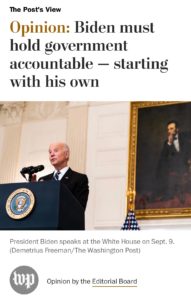This post from Open The Government originally appeared here.
January 22, 2021
Washington, D.C. — By signing an executive order on ethics commitments for the executive branch on his first day in office, President Joe Biden demonstrated the importance of structural ethics reforms that protect the public interest rather than public officials’ gain.
The executive order is a major victory for accountability experts from across the political spectrum, who in 2020 developed the ethics recommendations in Accountability 2021.
Convened by Open The Government, the Accountability 2021 initiative was created by a broad coalition of good government, democracy reform, anti-corruption, and civil rights organizations as a roadmap designed to help the new administration address gaps in oversight laws and practices that, combined with the Trump’s administration’s disdain for ethical norms against conflicts of interest and self-dealing, created a historic crisis in our democracy.
The initiative called on the president to issue a strong executive order on Day One to elevate ethics as a core value in the executive branch. President Biden did just that, and advocates will look to his administration to continue making ethics reform a priority.
“Unethical behavior by government officials has contributed to the public’s deep distrust of government. President Biden’s ethics plan sends a strong message that his administration is committed to reversing course by instilling a culture of ethics from the top down,” said Lisa Rosenberg, executive director of Open The Government.
“We are thrilled Biden recognized the value of the practical yet transformational ethics solutions mapped out in Accountability 2021 and encourage the new administration to adopt more of the recommendations to repairour democratic foundations, and help rebuild them so that our institutions serve us all better than at any time (or administration) in the past,” said Rosenberg.
Below are several of the ethics recommendations in Accountability 2021 reflected in Biden’s Day One actions:
- Issue an ethics executive order that incorporates best practices from previous administrations’ ethics orders, including a strong ethics pledge.
- Require all senior executive branch officials to sign an ethics pledge under oath that addresses both the conflicts of interest of the “reverse revolving door” upon entering and leaving government.
- Ban officials from accepting a “golden parachute” from their former employers.
- Ensure that the ethics pledge for his appointees includes a revolving door prohibition, banning former appointees from lobbying anyone in the administration on behalf of a paying client for two years after leaving public service.
- Grant revolving door restriction waivers, if it can be reasonably demonstrated that the incoming official’s service is necessary to the operation of the government.
- Prohibit officials from interfering with federal law enforcement matters, ensuring the independence of Department of Justice investigative and prosecutorial decisions.
The Biden administration also committed to other Day One and short-term Accountability 2021 recommendations, including:
- Resume the release of White House visitor logs. The White House has promised to release visitor logs once visits are safe again due to the COVID-19 pandemic.
- Conduct a review of ongoing national emergencies. Biden retracted the declaration of the border wall construction as a national emergency.
- Delay implementation of rules not yet in effect. The administration ordered a freeze on any rules not yet finalized, and asked agencies to consider delaying implementation of finalized rules for 60 days.
- Rescind Executive Orders Undermining Important Public Protections. The Biden administration has revoked several of the executive orders outlined in Accountability 2021 to ensure that regulatory actions are made in the public interest.
- Rebalance the regulatory process to advance health, safety, justice, democracy, and equity values. The administration’s regulatory review embodies the recommendation to give careful consideration to the non-monetary benefits of regulation.
- Ensure that major policy decisions related to the coronavirus pandemic are informed by medical, scientific, and health experts within the government. The Biden administration has committed to being transparent about the pandemic.
A summary of the broader recommendations mapped out in Accountability 2021 for the new administration is available here.


